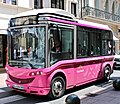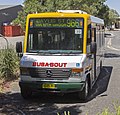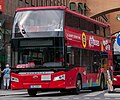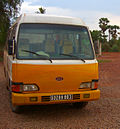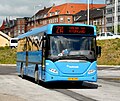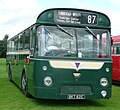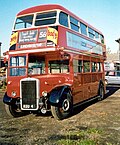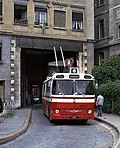0–9
| Bus | Image | Type | Manufacturer | Year | Notes | Country |
|---|---|---|---|---|---|---|
| 021 |  | Single deck | Jelcz | 1967 to 1979 | Articulated | Poland |
| 043 |  | Single deck | Jelcz | 1959 to 1986 | Poland | |
| 080 |  | Single deck | Jelcz | 1978 to 1984 | Poland | |
| 1 CB |  | Single deck | Berliet | 1911 | France | |
| 2.0 |  | Single deck | Ebusco | 2014 | Electric | Netherlands |
| 2.1 |  | Single deck | Ebusco | 2017 | Electric | Netherlands |
| 2.2 |  | Single deck | Ebusco | 2018 | Electric | Netherlands |
| 2X |  | Minibus | Power Vehicle Innovation | 2011 | Electric | France |
| 3 |  | Single deck | KAG | 1956 to 1990 | Lithuanian SSR | |
| 3.0 |  | Single deck | Ebusco | 2019 | Electric | Netherlands |
| 3-series |  | Single deck | Scania | 1988 to 1999 | Sweden | |
| 3DUK-50 |  | Single deck | Saurer | 1968 to 1973 | Switzerland | |
| 3Ro |  | Single deck | Lancia | 1938 to 1949 | Italy | |
| 3Tr |  | Single deck | Škoda | 1941 to 1948 | Trolleybus | Czech Republic |
| 4 GTP |  | Single deck | Berna | Trolleybus | Switzerland | |
| 4 UPO |  | Single deck | Berna | 1946 | Switzerland | |
| 4-series |  | Single deck | Scania | 1997 to 2006 | Sweden | |
| 4.80 |  | Single deck | APE | 1961 to 1976 | Trailer bus | Switzerland |
| 4H |  | Single deck | Saurer | 1941 | Switzerland | |
| 4X |  | Single deck | Power Vehicle Innovation | Electric | France | |
| 5 DUK |  | Single deck | Saurer | 1953 to 1975 | Switzerland | |
| 5C |  | Single deck | Chavdar | Bulgaria | ||
| 6Tr |  | Single deck | Škoda | 1949 | Trolleybus | Czech Republic |
| 7Tr |  | Single deck | Škoda | 1950 to 1955 | Trolleybus | Czech Republic |
| 8Tr |  | Single deck | Škoda | 1956 to 1961 | Trolleybus | Czech Republic |
| 9Tr |  | Single deck | Škoda | 1958 to 1981 | Trolleybus | Czech Republic |
| 10LF |  | Single deck | Autosan | 2012 | Poland | |
| 11G5 |  | Single deck | Chavdar | 1975 | On license Kasbohrer | Bulgaria |
| 11M3 |  | Single deck | Chavdar | 1970 | Bulgaria | |
| 11M4 |  | Single deck | Chavdar | 1977 | Bulgaria | |
| 12M |  | Single deck | Ashok Leyland | India | ||
| 14Tr |  | Single deck | Škoda Transportation | 1981 to 2003 | Trolleybus | Czech Republic |
| 14TrM |  | Single deck | Škoda | 1995 to 2004 | Trolleybus | Czech Republic |
| 15Tr |  | Single deck | Škoda | 1988 to 2004 | Articulated trolleybus | Czech Republic |
| 15TrM |  | Single deck | Škoda | 1995 to 2004 | Articulated trolleybus | Czech Republic |
| 15TrSF |  | Single deck | Škoda | 2002 to 2003 | Articulated trolleybus operated by MUNI | Czech Republic |
| 17Tr |  | Single deck | Škoda | 1987 to 1990 | Trolleybus | Czech Republic |
| 18 |  | Single deck | Fiat | 1911 to 1921 | Italy | |
| 18.2x0 |  | Single deck | MAN Truck & Bus | 1998 to 2017 | Germany | |
| 21Tr |  | Single deck | Škoda | 1995 to 2004 | Trolleybus | Czech Republic |
| 22Tr |  | Single deck | Škoda | 2002 to 2004 | Articulated trolleybus | Czech Republic |
| 24.310 / 24.350 |  | Double deck | MAN Truck & Bus | 1998 | Germany | |
| 24 CV |  | Single deck | De Dion-Bouton | 1905 | France | |
| 24Tr Irisbus |  | Single deck | Škoda Irisbus | 2003 to 2014 | Trolleybus | Czech Republic |
| 25Tr |  | Single deck | Škoda | 2005 to 2014 | Articulated trolleybus | Czech Republic |
| 26Tr |  | Single deck | Škoda | 2009 | Trolleybus | Czech Republic |
| 27Tr Solaris |  | Single deck | Škoda Solaris | 2009 to present | Articulated trolleybus | Czech Republic |
| 28Tr |  | Single deck | Škoda | 2008 to 2015 | Trolleybus | Czech Republic |
| 30 |  | Single deck | Ikarus | 1951 to 1957 | Hungary | |
| 30-LFN |  | Single deck | NABI | 2005 | USA | |
| 30Tr SOR |  | Single deck | Škoda SOR Libchavy | 2011 to present | Trolleybus | Czech Republic |
| 31 |  | Single deck | Ikarus | 1956 to 1965 | Hungary | |
| 31-LFW CNG |  | Single deck | NABI | 2018 | USA | |
| 31Tr SOR |  | Single deck | Škoda SOR Libchavy | 2010 to present | Articulated trolleybus | Czech Republic |
| 32Tr SOR |  | Single deck | Škoda SOR Libchavy | Trolleybus | Czech Republic | |
| 33Tr SOR |  | Single deck | Škoda SOR Libchavy | Articulated trolleybus | Czech Republic | |
| 34 |  | Single deck | SPA | 1927 | Italy | |
| 35-LFW |  | Single deck | NABI | 1998 to 2013 | USA | |
| 35Tr |  | Single deck | Škoda | 2020 | Articulated trolleybus | Czech Republic |
| 38-S-DT |  | Single deck | Twin Coach | 1948 | USA | |
| 40A |  | Single deck | Alfa Romeo | 1932 to 1934 | Italy | |
| 40GWFT |  | Single deck | Twin Coach | 1940 | Trolleybus | USA |
| 40VH |  | Single deck | Franz Brozincevic Wetzikon | 1970s | Switzerland | |
| 40-LFW (Gen I) |  | Single deck | NABI | 2008 | USA | |
| 40-LFW (Gen II) |  | Single deck | NABI | 2008 | USA | |
| 40-LFW (Gen III) |  | Single deck | NABI | 2020 | USA | |
| 40-R |  | Single deck | Twin Coach | 1937 | USA | |
| 42-BRT |  | Single deck | NABI | 2006 to 2015 | USA | |
| 44TTW |  | Single deck | Twin Coach | 1949 | Trolleybus | USA |
| 50U |  | Single deck | Franz Brozincevic Wetzikon | 1970s | Switzerland | |
| 54 |  | Double deck | Waggonbau Bautzen | 1954 to 1957 | Germany | |
| 55 |  | Single deck | Ikarus | 1955 to 1973 | Hungary | |
| 56 |  | Double deck | Waggonbau Bautzen | 1957 to 1959 | Germany | |
| 60 |  | Single deck | Ikarus | 1952 to 1959 | Hungary | |
| 60T |  | Single deck | Ikarus | 1952 to 1976 | Trolleybus | Hungary |
| 60-BRT |  | Single deck | NABI | 2015 | Articulated | USA |
| 60-LFW | Single deck | NABI | 2005 | USA | ||
| 66 |  | Single deck | Ikarus | 1955 to 1973 | Hungary | |
| 80A | Single deck | Alfa Romeo | late 1920s | Italy | ||
| 85A |  | Single deck | Alfa Romeo | 1933 to 1940 | Italy | |
| 85AF | Single deck | Alfa Romeo | 1936 to 1940 | Trolleybus | Italy | |
| 91U EU4A | 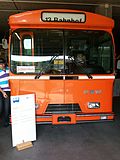 | Single deck | Franz Brozincevic Wetzikon | Switzerland | ||
| 100 |  | Single deck | BKM | 1993 to 1994 | Trolleybus | Belarus |
| 100 L6 | 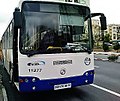 | Single deck | SNVI | Algeria | ||
| 100 V8 |  | Single deck | SNVI | Algeria | ||
| 101 |  | Single deck | MAZ | 1993 to 1998 | Belarus | |
| 101 |  | Single deck | BKM | 1994 to 2003 | Trolleybus | Belarus |
| 102-A2 |  | Single deck | Motor Coach Industries | 1986 to 1991 | Canada | |
| 102-B3 |  | Single deck | Motor Coach Industries | 1991 to 1994 | Canada | |
| 102-C3 |  | Single deck | Motor Coach Industries | 1988 to 1993 | Canada | |
| 102-DL3 |  | Single deck | Motor Coach Industries | 1992 to 2005 | Canada | |
| 102-EL3 |  | Single deck | Motor Coach Industries | 1998 to 2013 | Canada | |
| 103 |  | Single deck | MAZ | 1996 to 2020 | Belarus | |
| 103T |  | Single deck | MAZ | 1999 | Trolleybus | Belarus |
| 104 |  | Single deck | MAZ | 1994 to 2007 | Belarus | |
| 105 |  | Single deck | MAZ | 1997 to 2013 | Articulated | Belarus |
| 107 |  | Single deck | MAZ | 2001 to present | Belarus | |
| 110A |  | Single deck | Alfa Romeo | 1934 to 1950 | Italy | |
| 110AF |  | Single deck | Alfa Romeo | 1939 to 1944 | Trolleybus | Italy |
| 112 UD |  | Single deck | Rocar | 1974 to 1980 | Romania | |
| 120 |  | Single deck | Chavdar | 1985 | Bulgaria | |
| 120M |  | Single deck | Jelcz | 1992 to 2007 | Poland | |
| 120M/3 |  | Single deck | Jelcz | 1999 to 2004 | Poland | |
| 120MM/2 |  | Single deck | Jelcz | 1998 to 2004 | Poland | |
| 120MT |  | Single deck | Jelcz | 1997 to 2005 | Trolleybus | Poland |
| 120MTr |  | Single deck | Jelcz | 1993 to 1998 | Trolleybus | Poland |
| 120MTE |  | Single deck | Jelcz | 1996 to 1997 | Trolleybus | Poland |
| 140 |  | Double deck | Lancia | 1967 to 1968 | Italy | |
| 140A |  | Single deck | Alfa Romeo | 1950 to 1958 | Italy | |
| 140AF |  | Single deck | Alfa Romeo | 1949 to 1960 | Trollleybus | Italy |
| 141 |  | Single deck | Chavdar | 1986 | Bulgaria | |
| 150A | Single deck | Alfa Romeo | 1957 to 1958 | Italy | ||
| 152 |  | Single deck | MAZ | 2000 to 2014 | Belarus | |
| 158 |  | Single deck | LiAZ | 1961 | Russia | |
| 171 |  | Single deck | MAZ | 2005 to present | Airside transfer | Belarus |
| 180 |  | Single deck | Ikarus | 1966 to 1973 | Articulated | Hungary |
| 201 |  | Single deck | BKM | 1996 to 2011 | Trolleybus | Belarus |
| 203 |  | Single deck | MAZ | 2006 to present | Belarus | |
| 203T |  | Single deck | MAZ | 2008 | Trolleybus | Belarus |
| 205 |  | Single deck | MAZ | 2009 to present | Articulated | Belarus |
| 206 |  | Single deck | MAZ | 2009 to present | Belarus | |
| 211 |  | Single deck | Ikarus | 1976 to 1990 | Hungary | |
| 213 |  | Single deck | BKM | 2002 to 2006 | Trolleybus | Belarus |
| 215 |  | Single deck | MAZ | 2013 to present | Articulated | Belarus |
| 216 |  | Single deck | MAZ | 2018 to present | Articulated | Belarus |
| 221 |  | Single deck | BKM | 2003 to present | Trolleybus | Belarus |
| 231 |  | Single deck | MAZ | 2013 | Belarus | |
| 241 |  | Single deck | MAZ | 2013 to 2018 | Midibus | Belarus |
| 246 |  | Single deck | Ikarus | 1996 | Hungary | |
| 250 |  | Single deck | Ikarus | 1970 to 1996 | Hungary | |
| 251 |  | Single deck | MAZ | 2006 to 2021 | Belarus | |
| 255 |  | Single deck | Ikarus | 1970 to 1990 | Hungary | |
| 256 |  | Single deck | Ikarus | 1977 to 1989 | Hungary | |
| 256 |  | Single deck | MAZ | 2005 to 2014 | Minibus | Belarus |
| 257 |  | Single deck | MAZ | 2019 | Midibus | Belarus |
| 260 |  | Single deck | Ikarus | 1971 to 2002 | Hungary | |
| 260T |  | Single deck | Ikarus | 1974 | Trolleybus | Hungary |
| 263 |  | Single deck | Ikarus | 1988 to 2001 | Hungary | |
| 266 |  | Single deck | Ikarus | 1972 to 1990 | Hungary | |
| 272 MEX |  | Single deck | Jelcz | 1963 to 1977 | Germany | |
| 280 |  | Single deck | Ikarus | 1973 to 2002 | Articulated | Hungary |
| 281 |  | Single deck | Ikarus | 1978 to 1993 | also articulated | Hungary |
| 282 |  | Single deck | Ikarus | 1976 to 1978 | Articulated | Hungary |
| 283 |  | Single deck | Ikarus | 1988 to 1997 | Articulated | Hungary |
| 284 |  | Single deck | Ikarus | 1981 to 1991 | Articulated | Hungary |
| 286 |  | Single deck | Crown-Ikarus | 1980 to 1986 | Articulated | Hungary USA |
| 300 / 320 / 340 |  | Single deck | Duple Coachbuilders | 1985 to 1989 | Bodywork[ clarification needed ] | United Kingdom |
| 303 |  | Single deck | Ikarus | 1959 to 1963 | Hungary | |
| 303 |  | Single deck | MAZ | 2019 to 2021 | Belarus | |
| 306 |  | Single deck | Fiat | 1956 to 1982 | 306/1 (1956 to 1960) 306/2 (1960 to 1962) 306/3 (1962 to 1982) | Italy |
| 308 |  | Single deck | Fiat | 1971 to 1978 | Italy | |
| 309 |  | Single deck | Fiat | 1958 to 1970 | Italy | |
| 314 |  | Single deck | Fiat | 1960 to 1978 | Italy | |
| 315 |  | Single deck | Custom Bus | Bodywork | Australia | |
| 315 |  | Single deck | Fiat | 1978 to 2001 | Italy | |
| 316 |  | Single deck | Iveco Bus | 1978 to 2000 | Italy | |
| 321 |  | Single deck | BKM | 2000 to present | Trolleybus | Belarus |
| 333 |  | Single deck | BKM | 1998 to 2016 | Articulated trolleybus | Belarus |
| 343 |  | Single deck | Fiat (1972 to 1978) | 1966 to 1978 | Chassis-only sold from 1966 to 1978 | Italy |
| 350 |  | Single deck | Ikarus | 1980s | Hungary | |
| 370 |  | Single deck | Fiat (1976-1980) Iveco (1980-1999) | 1976 to 1999 | Chassis-only sold from 1978 to 1999. | Italy |
| 400 |  | Single deck | Tatra | 1948 to 1955 | Trolleybus | Czech Republic |
| 401 |  | Single deck | Fiat | 1953 to 1958 | Italy | |
| 403 RHD | Single deck | Fabrika automobila Priboj | Serbia | |||
| 405 |  | Single deck | Ikarus | 1995 | Hungary | |
| 405G |  | Single deck | Neobus | Serbia | ||
| 409 |  | Single deck | Fiat | 1962 to 1979 | Italy | |
| 410 |  | Single deck | Fiat | 1960 to 1973 | Italy | |
| 411 |  | Single deck | Fiat | 1956 to 1964 | Italy | |
| 411LM |  | Single deck | Saurer | 1957 | Trolleybus | Switzerland |
| 411T |  | Single deck | Ikarus | 1994 | Trolleybus | Hungary |
| 412 | 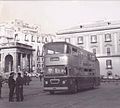 | Double deck | Fiat | 1961 to 1970 | Italy | |
| 412 |  | Single deck | Ikarus | 1996 to 2002 | Hungary | |
| 412T |  | Single deck | Ikarus | 1999 to 2002 | Trolleybus | Hungary |
| 413 |  | Double deck | Fiat | 1961 to 1961 | Viberti Monotral CV61 | Italy |
| 414 |  | Single deck | Fiat | 1960 to 1973 | Italy | |
| 415 |  | Single deck | Ikarus | 1987 to 2002 | Hungary | |
| 415 |  | Single deck | Saurer | Trolleybus | Switzerland | |
| 415T |  | Single deck | Ikarus | 1997 to 2002 | Trolleybus | Hungary |
| 416 |  | Single deck | Fiat | 1964 to 1973 | Italy | |
| 416-SFW |  | Single deck | NABI | 1989 to 2013 | USA | |
| 417 |  | Single deck | Ikarus | 1995 to 2002 | Hungary | |
| 418 |  | Single deck | Fiat | 1972 to 1982 | Italy | |
| 420 |  | Single deck | BKM | 2008 to present | Trolleybus | Belarus |
| 421 |  | Single deck | Fiat | 1973 to 1983 | Italy | |
| 425 |  | Single deck | Duple Coachbuilders | 1984 to 1989 | Running units supplied by Dennis | United Kingdom |
| 430A | Single deck | Alfa Romeo | 1949 to 1953 | Italy | ||
| 435 |  | Single deck | Ikarus | 1985 to 2002 | Articulated | Hungary |
| 435T |  | Single deck | Ikarus | 1994 to 1996 | Trolleybus | Hungary |
| 436-SFW |  | Single deck | NABI | 1991 to 2002 | USA | |
| 438 |  | Single deck | Ikarus | 1996 | Articulated | Hungary |
| 470 |  | Single deck | Fiat | 1979 to 1986 | Italy | |
| 480 |  | Single deck | Ikarus | 1990 to 1997 | Hungary | |
| 481 |  | Single deck | Ikarus | 1998 to 1999 | Hungary | |
| 500 HB |  | Single deck | Tatra | 1950 to 1957 | Czech Republic | |
| 500A | Single deck | Alfa Romeo | 1945 to 1948 | Italy | ||
| 510 |  | Single deck | Custom Bus | Bodywork | Australia | |
| 521 |  | Single deck | Ikarus | 1987 to 1990 | Hungary | |
| 550 |  | Single deck | Custom Bus | Bodywork | Australia | |
| 556 |  | Single deck | Ikarus | 1965 to 1973 | Hungary | |
| 600 |  | Single deck | MCV | 1996 to present | Chassis: Mercedes-Benz OC 500 RF 2542 | Egypt |
| 618R |  | Single deck | Fiat | 1934 to 1937 | Italy | |
| 625 |  | Single deck | Fiat/Van Hool-Fiat | 1965 to 1972 | Italy/Belgium | |
| 630 |  | Single deck | Ikarus | 1959 to 1971 | Hungary | |
| 635F |  | Single deck | Fiat | 1937 to 1941 | Trolleybus | Italy |
| 642RN |  | Single deck | Fiat | 1949 to 1953 | Italy | |
| 651 |  | Single deck | GAZ | 1951 to 1973 | Russia | |
| 652 |  | Single deck | PAZ | 1958 to 1968 | Minibus | Soviet Union |
| 656RN |  | Single deck | Fiat | 1932 to 1945 | Italy | |
| 666RN |  | Single deck | Fiat | 1948 to 1953 | Italy | |
| 668F |  | Single deck | Fiat | 1950 to 1960 | Trolleybus | Italy |
| 672 |  | Single deck | PAZ | 1967 to 1993 | USSR | |
| 672F |  | Single deck | Fiat | 1940 to 1954 | Trolleybus | Italy |
| 672RN |  | Single deck | Fiat | 1948 to 1952 | Italy | |
| 677 |  | Single deck | LiAZ | 1968 to 2000 | Russia | |
| 680RN |  | Single deck | Fiat | 1949 to 1954 | Italy | |
| 682RN |  | Single deck | Fiat | 1953 to 1957 | Italy | |
| 685 |  | Single deck | KAvZ | 1971 to 1993 | Minibus | Russia |
| 695 |  | Single deck | Lviv Bus Factory | 1956 to 2008 | Ukraine | |
| 695 |  | Double deck | Ikarus | 1982 | Articulated | Hungary |
| 697 |  | Single deck | LAZ | 1959 to 1985 | Ukraine | |
| 699 |  | Single deck | LAZ | 1961 to 2002 | Ukraine | |
| 700 / 800 / 900 series |  | Single deck | New Flyer AM General (licensed production in USA) | 1967 to 1987 | Canada USA | |
| 703 |  | Single deck | Lancia | 1957 to 1964 | Articulated | Italy |
| 706 RTO |  | Single deck | Škoda Karosa | 1958 to 1972 | Czech Republic | |
| 706 RTO-K |  | Single deck | Škoda Karosa | 1960 | Articulated | Czech Republic |
| 718 | 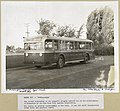 | Single deck | Yellow Coach | 1934 to 1936 | USA | |
| 718 |  | Single deck | Lancia | 1973 to 1974 | Italy | |
| 719 |  | Single deck | Yellow Coach | 1934 to 1936 | USA | |
| 731 |  | Single deck | Yellow Coach | 1935 to 1936 | USA | |
| 750 HO-SL |  | Single deck | MAN | 1969 to 1975 | Germany | |
| 761T |  | Double deck | Associated Equipment Company | 1933 to 1934 | United Kingdom | |
| 800 |  | Double deck | MCV | 2016 to present | Chassis: Mercedes-Benz OC 500 RF 2542 | Egypt |
| 800AF | Single deck | Alfa Romeo | 1940 to 1954 | Trolleybus | Italy | |
| 870 | 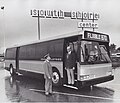 | Single deck | Flxible | 1976 | USA | |
| 890 UG |  | Single deck | MAN | 1969 to 1975 | Articulated | Germany |
| 900A | Single deck | Alfa Romeo | 1952 to 1956 | Italy | ||
| 900AF | Single deck | Alfa Romeo | 1955 to 1957 | Trollleybus | Italy | |
| 902A | Single deck | Alfa Romeo | 1957 to 1959 | Italy | ||
| 911AF | Single deck | Alfa Romeo | 1959 to 1960 | Trollleybus | Italy | |
| 977 |  | Single deck | RAF | 1958 to 1976 | Minibus | Soviet Union |
| 1200B |  | Single deck | Danish Automobile Building | 1980s to 1990s | Denmark | |
| 1510 1512 |  | Chassis | Tata Motors | India | ||
| 1800B |  | Single deck | Danish Automobile Building | 1980s to 1990s | Articulated | Denmark |
| 2203 |  | Minibus | RAF | 1976 to 1997 | Latvia | |
| 2215 |  | Single deck | BAZ | 2003 to 2010 | Ukraine | |
| 2400 |  | Single deck | Cobus Industries | Airport bus | Germany | |
| 2401 |  | Single deck | Fiat | 1953 to 1958 | Trolleybus | Italy |
| 2405 |  | Single deck | Fiat | 1955 to 1960 | Trolleybus | Italy |
| 2411 |  | Single deck | Fiat | 1955 to 1969 | Trolleybus | Italy |
| 2411/1 Cansa |  | Single deck | Cansa | 1961 to 1966 | Trolleybus | Italy |
| 2470 |  | Single deck | Iveco | 1979 to 1986 | Trolleybus | Italy |
| 2472 Viberti |  | Single deck | Fiat | 1958 to 1965 | Articulated trolleybus | Italy |
| 2700 |  | Single deck | Cobus Industries | Airport bus | Germany | |
| 3000 |  | Rear-engine chassis | Navistar International | 1996 to 2024 | Used primarily for school buses | USA |
| 3000 |  | Single deck | Cobus Industries | Airport bus | Germany | |
| 3203 | Single deck | PAZ | 2006 to present | Minibus | Russia | |
| 3204 |  | Single deck | PAZ | 2006 to 2018 | Minibus | Russia |
| 3205 |  | Single deck | PAZ | 1989 to present | Minibus | Ukraine |
| 3206 |  | Single deck | PAZ | 1995 | Minibus | Russia |
| 3237 |  | Single deck | PAZ | 2002 to present | Midibus | Russia |
| 3244 |  | Single deck | KAvZ | 1966 to 2006 | Minibus | Russia |
| 3300 |  | Chassis | Navistar International | 2005 to 2024 | Used primarily for school buses | USA |
| 3800 |  | Chassis | Navistar International | 1989 to 2004 | Used primarily for school buses | USA |
| 3900 |  | Forward control chassis | Navistar International | 1990 to 2010 | Used primarily for school buses. | USA |
| 3976 |  | Single deck | KAvZ | 1992 to 2008 | Minibus | Russia |
| 4202 |  | Single deck | LAZ | 1978 to 1985 | Ukraine | |
| 4230 |  | Single deck | PAZ | 2001 to 2002 | Midibus | Russia |
| 4234 |  | Single deck | PAZ | 2002 | Midibus | Russia |
| 4292 |  | Single deck | LiAZ | 2015 | Russia | |
| 5250 |  | Single deck | LiAZ | 2011 to 2014 | Russia | |
| 5251 |  | Single deck | LiAZ | 2014 | Russia | |
| 5256 |  | Single deck | LiAZ | 1986 to 2021 | Soviet Union / Russia | |
| 5280 |  | Single deck | LiAZ | 2005 to 2012 | Trolleybus | Russia |
| 5292 |  | Single deck | LiAZ | 2004 | Russia | |
| 5293 |  | Single deck | LiAZ | 2006 | Russia | |
| 5299 |  | Single deck | NefAZ | 2000 | Russia | |
| 5917 | Single deck | LiAZ | 1989 to 1992 | Soviet Union / Russia | ||
| 6212 |  | Single deck | LiAZ | 2002 | Articulated | Russia |
| 6213 |  | Single deck | LiAZ | 2008-2014, 2016 to present | Articulated bus | Russia |
| 6224 | Single deck | LiAZ | 2004 to 2005 | Russia | ||
| 6228 |  | Single deck | LiAZ | 2006 to 2016 | Russia | |
| 6274 |  | Single deck | LiAZ | 2018 | Electric bus | Russia |
| 7500 |  | Single deck | Volvo Buses | 2005 to 2011 | Bi-articulated | Sweden |
| 7700 |  | Single deck | Volvo Buses | 1999 to 2012 | Sweden Finland Poland | |
| 7900 |  | Single deck | Volvo Buses | 2011 to present | Sweden Poland | |
| 8500 |  | Single deck | Volvo Buses | 2001 to 2011 | Sweden Denmark | |
| 8700 |  | Single deck | Volvo Buses | 2002 to 2011 | Sweden Finland Poland | |
| 8900 |  | Single deck | Volvo Buses | 2010 to present | Sweden Poland | |
| 9400 | Single deck | Volvo Buses | 2001 to present | India | ||
| 9600 | Single deck | Volvo Buses | 2022 to present | India | ||
| 9700 |  | Single deck | Volvo Buses | 2001 to present | Sweden Finland Poland Mexico | |
| 9900 |  | Single deck | Volvo Buses | 2001 to 2005 2007 to present | ||
| 10240T |  | Single deck | AM General | 1970s | Trolleybus | USA |
| 42021 |  | Single deck | LAZ | 1985 to 1993 | Ukraine | |
| 43303A |  | Single deck | BKM | 2012 to 2013 | Articulated trolleybus | Belarus |
| 52765 |  | Single deck | NefAZ | 2009 to 2010 | Trolleybus | Russia |
| 52802 |  | Single deck | LiAZ | 2005 to 2007 | Trolleybus | Russia |



















































































































































































